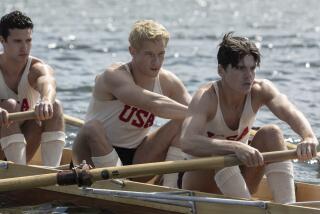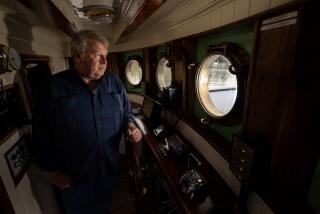Adventurer John Fairfax dies at 74; rowed across the Atlantic and Pacific oceans
- Share via
After adventurer John Fairfax became the first person in recorded history to row solo across the Atlantic Ocean, he said he couldn’t have done it without the help of “a great teacher,” a pirate.
The navigational skills needed for his six-month trip in 1969 from the Canary Islands to Florida had been honed during Fairfax’s three years as a buccaneering smuggler, he later said.
In 1972, Fairfax once again made history when he and his girlfriend became the first known people to cross the Pacific Ocean by rowboat. During the yearlong 8,000-mile trek from San Francisco to Australia, Fairfax survived a shark attack and a cyclone.
Fairfax, who in later years was a professional gambler, died Feb. 8 at his home in Henderson, Nev., apparently of a heart attack, said his wife, Tiffany. He was 74.
“He was a man of unbelievable strength and courage and confidence in everything he did,” his wife told the Associated Press. “He thought nature was a worthy challenge, and he loved nature.”
Born May 21,1937, in Rome, he was the only child of a British father who worked for the BBC and a Bulgarian mother.
From an early age, he had stories to tell. At 9, Fairfax was thrown out of the Italian Boy Scouts for firing a pistol at fellow Scouts. With his mother, Fairfax soon moved to Argentina and, by his own account, left home at 13 to live in the jungle.
“I wanted to go to the Amazon and live like Tarzan,” Fairfax later said. “I had a fixation from an early age to be one with nature.”
After three or four months in the jungle, he would emerge to sell skins, mostly jaguar and ocelot, according to a biography on the website of Ocean Rowing Society International.
In 1957, Fairfax published a book in Spanish about his exploits, “Vagabundos Bajo El Sol” (Vagabonds Under the Sun). A photo in the book shows him shirtless with a snake draped over his shoulders.
He once bicycled from San Francisco to Guatemala and then hitchhiked to Panama, where he met the pirate. Within a year, Fairfax was captain of a boat and smuggling guns, cigarettes and whiskey. Later he briefly managed a mink farm.
But he had been fascinated with seagoing exploits since childhood, when he treasured a Reader’s Digest account of two Norwegians who rowed across the Atlantic in 1896.
On Jan. 20, 1969, Fairfax took off in the Britannia, a rowboat designed to be self-bailing and to right itself in seconds if overturned. He fell overboard once, battled exhaustion and loneliness and had several encounters with sharks. On his 32nd birthday, he wrote in his log that he felt “like a hundred.”
The winds elongated the 3,600-mile journey to an estimated 5,000 miles. He survived by eating up to eight pounds of fish a day and converting ocean water into drinking water.
After arriving at Hollywood Beach, Fla., on July 19, 1969, Fairfax said he planned to celebrate with “a nice steak, a bottle of Scotch and two aspirin.”
While seeking people to help plan his first transoceanic trip, he met Sylvia Cook, a secretary who became his girlfriend and fellow traveler on his two-person expedition.
“The only reason I am doing it is because it is the hardest way to cross the Pacific,” Fairfax told The Times in 1971. “This is the Everest of the sea.”
They set out in another custom-made rowboat, the Britannia II, in April 1971 and endured fierce storms and a cyclone that knocked out their ability to communicate for the final two months of the trip. Unable to swim, Cook spent much of the trip lashed to the boat.
“Had Been Feared Drowned” a Times headline declared when they arrived 363 days later at Hayman Island, a resort off the coast of Australia. Both appeared to be in good physical shape, but Fairfax had a deep gash on his arm caused by a shark bite while he was spearing fish.
“There you are on the Pacific Ocean and there’s no hospital, and you need to row. He was an amazing, amazing human being,” said Tiffany Fairfax, his wife of 31 years. She writes an astrology column for a Las Vegas-area publication and is his only immediate survivor.
In the early 1970s, Fairfax wrote two memoirs, “Britannia: Rowing Alone Across the Atlantic” and, with Cook, “Oars Across the Pacific.”
After his second historic voyage, he declared: “It was a miserable journey. I don’t care if I never touch another oar.”
More to Read
Start your day right
Sign up for Essential California for the L.A. Times biggest news, features and recommendations in your inbox six days a week.
You may occasionally receive promotional content from the Los Angeles Times.



















































